30 April 2022
Interview of US Deputy Assistant Secretary of State overseeing policy for Southern Europe and the Caucasus Erika Olson to APA.
– First of all thanks a lot for taking your time to answer our questions, despite your busy schedule, Mrs. Olson. I would like to start our interview with a question about bilateral relations between the United States and Azerbaijan. This year countries celebrate the 30 anniversary of diplomatic relations. How would you evaluate the current state of relations? And what are the United States’ targets to achieve in cooperation with Azerbaijan for the next decades?
– Thank you. I am glad to be able to talk to you today and very happy to be back in Baku again. We are very honored to be celebrating thirty years of diplomatic relations between the United States and Azerbaijan. And also what is really important is thirty years of independence for Azerbaijan and no one has been a greater supporter of Azerbaijan’s independence than the United States over the last thirty years.
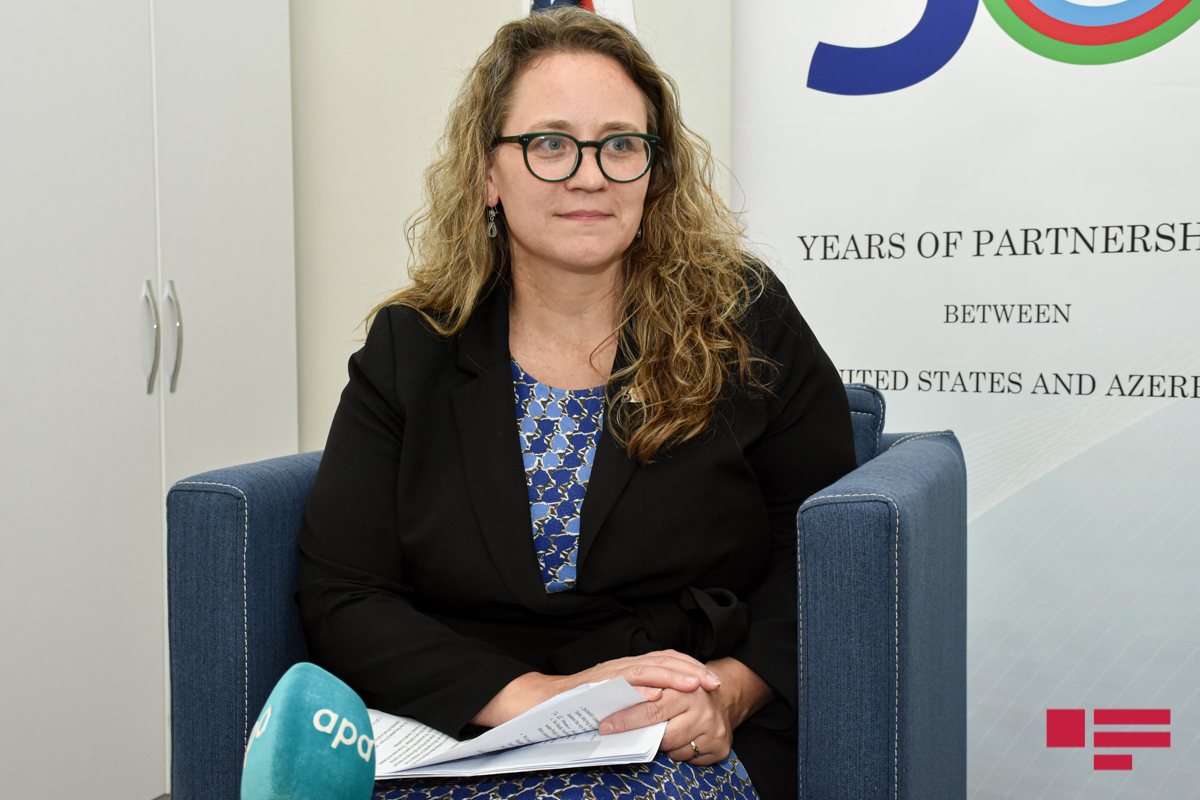
We have done together, we have done so many things not only to deepen our bilateral government-to-government relationship but also people-to-people, and really amazing things that help in terms of broader security issues for the region.
Looking back over the last thirty years, I think, one of the things that we are most proud of is how we were able to work together in terms of developing the Southern Energy Corridor. And that really was a project that came about with the creativity, the motivation, and partnership between the United States and Azerbaijan, as well as with other countries. Additionally, looking at where we are now, even during COVID-19, last year 500 Azerbaijani students went to the United States to study. We are also very honored to have, opened new American corners in Azerbaijan this year and that just supports all of the things that we want to do together with the English language. We can work to help Azerbaijan to create jobs, and create opportunities for young people as they learn English and develop their skills.
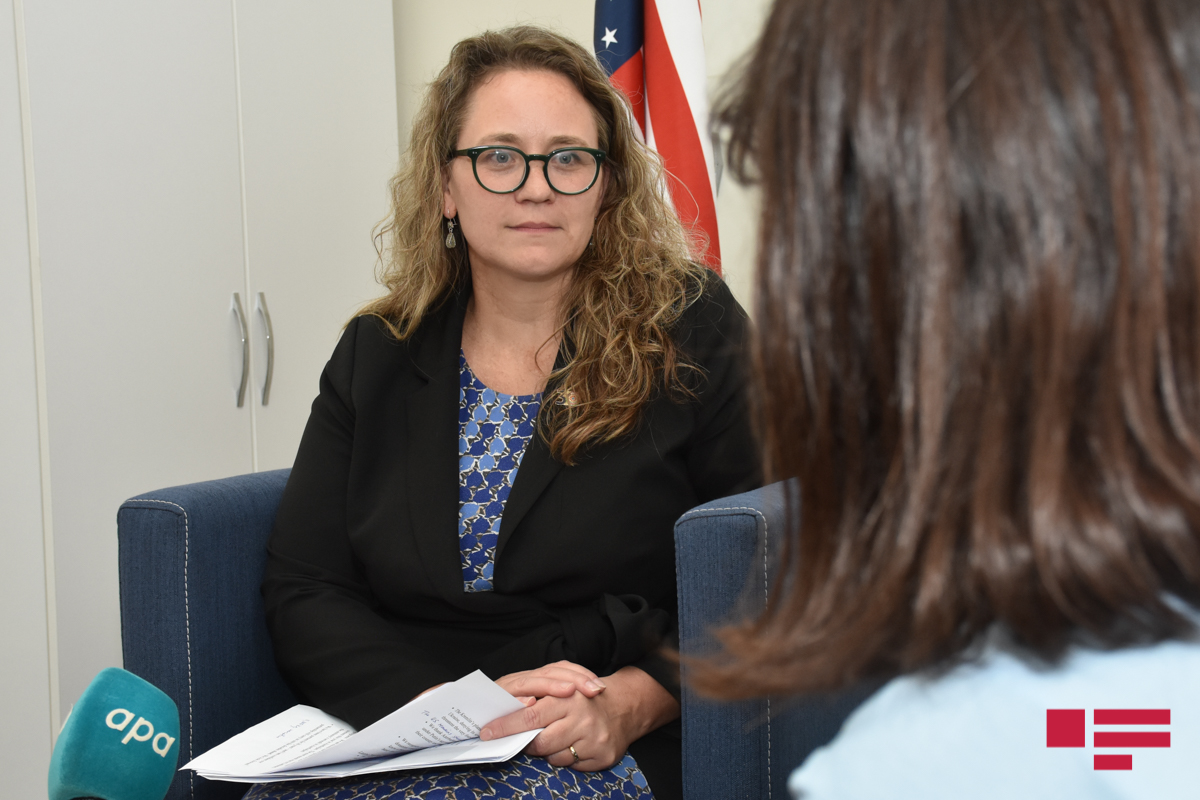
If we take into account how many Azerbaijani students have studied in the United States over the past 30 years, we can see how this has become a key pillar for the future of relations between Americans and Azerbaijanis.
We look forward to the next 30 years to see how we can truly work together to bring peace and stability to the region, and economic and cultural benefits, based on this partnership.
– There is optimism that finally, peace comes to the South Caucasus, we are observing some sparkles in this regard, as you know, direct contacts, meetings, the Brussels process… How can the United States contribute to the process, to accelerate in order to get tangible results?
– We, the United States, remain absolutely dedicated to the process of reaching a long-lasting peace in the region. We do want to look forward, any of us, to thirty years and do not want to see the same challenges and now it is the time.
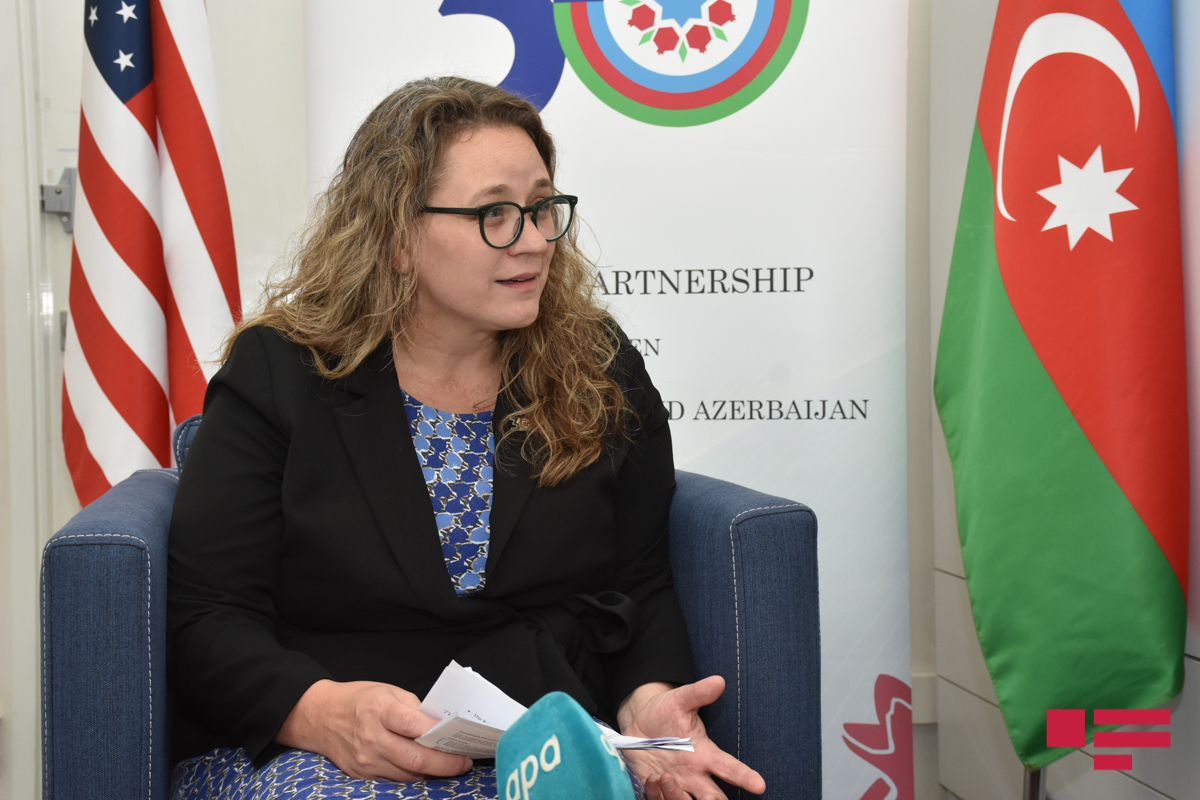
I feel like there is really a window to be able to work towards peace and there is really a willingness, I think, throughout the region, in Armenia and Azerbaijan and in Georgia in terms of helping to support that process. You ask what the United States is doing and how engaging, we partnering very closely with the European Union and we have had the Special Representative for the Caucasus from the European Union in the United States earlier this month, he will be there again as part of the Georgia process we will be hosting a meeting in Washington on that later next week.
We have been very committed to playing the role of supporting both sides and trying to find ways to help, both sides understand the challenges and the opportunities.
I think also looking ways through US expertise and experience, for instance, border demarcation and delimitation. How we can support this process both through experience but also with you know potential actual assistance itself.
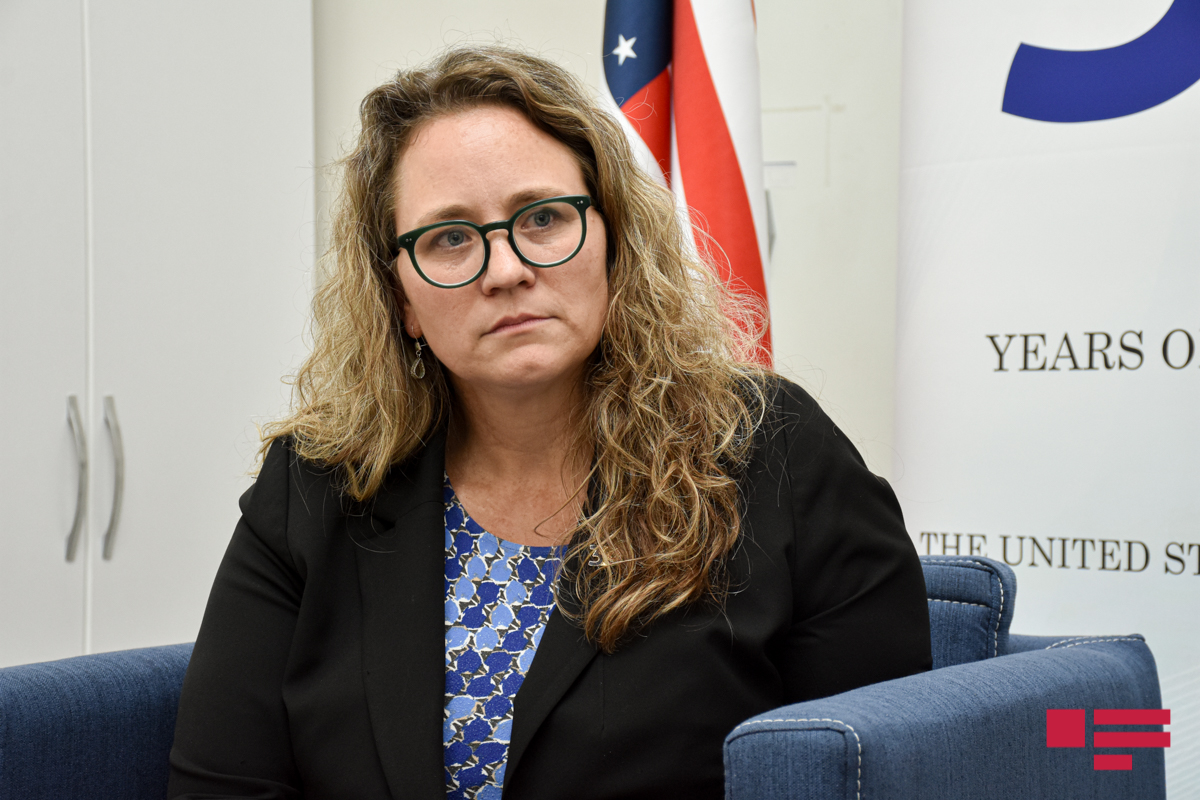
I think one of the things I have been struck by since I started this job and have really been working on increasing US engagement in the region. Because this is something that we heard in Georgia, we heard here, in Baku, also in Yerevan, really desire for the United States to be present in the region. We have been very focused on that.
But also focused on, particularly as you asked in the case of Azerbaijan and Armenia, helping bring leaders together, helping bring people together to have a direct conversation. This is what we have found as that has happened.
The ability to communicate and the misunderstandings will decrease. So, that is, we remain absolutely committed to helping Azerbaijanis and Armenians talk to each other, government-to-government but also in Track II efforts, with scientists, journalists, and students and that is something that we will continue to work on going forward.
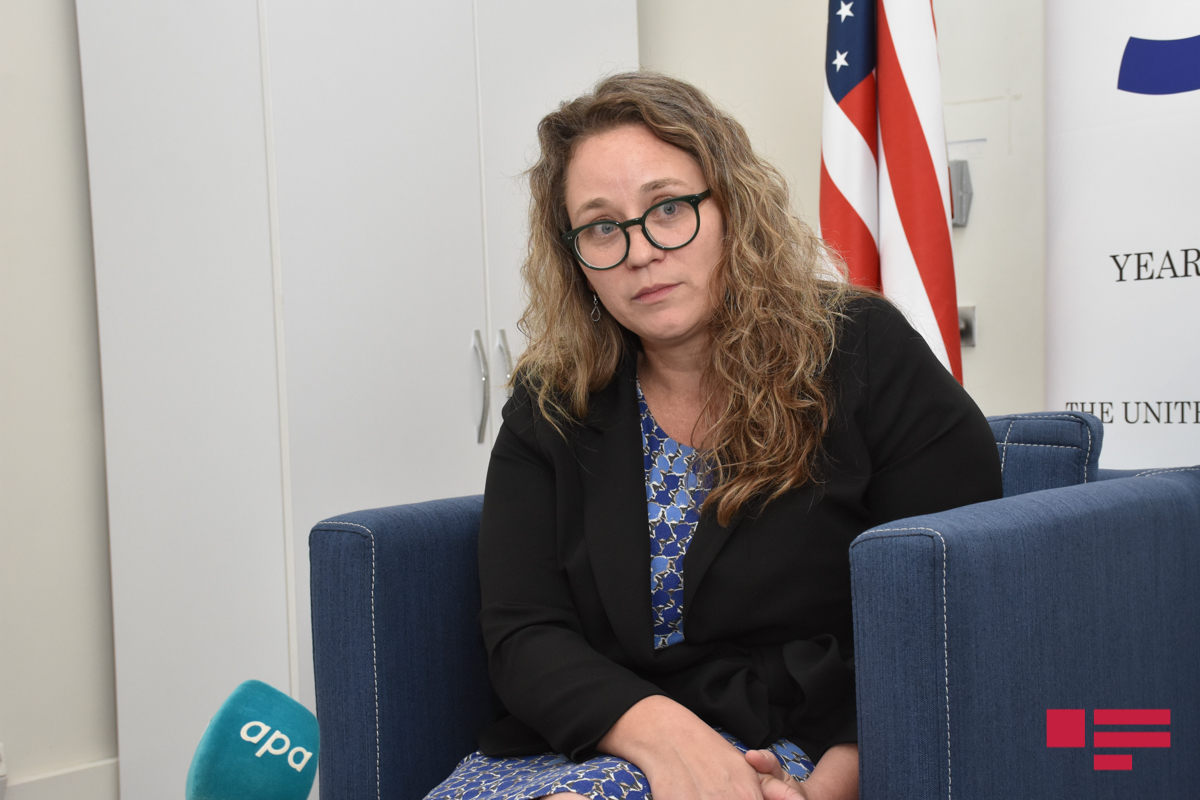
– Well, I think this is a question that is the most popular one in both Armenian and Azerbaijani societies, the fate of the OSCE Minsk Group. It was pretty much clear the position of leadership of Azerbaijan and Armenia on this mediation group, but after the war in Ukraine, Moscow announced that there is no coordination among co-chairs and the Russian MFA appointed a special envoy. The co-chair from your country has already been introduced as a special envoy, at least what we see that part is not highlighted too much…
– I think I understand your question. The one thing that I want to highlight is that Andrew Schofer has always been in that position, had the title of Special Negotiator for Caucasus conflicts, as well as the US representative on the OSCE Minsk Group Co-Chairs.
He has been involved throughout, I mention, Georgia and in the process of trying to help with South Ossetia and Abkhazia and the future of that and involved in those conversations.
So, I cannot speak for Russians, what kind of calculations that Foreign Minister Lavrov might be making, or any new title that Igor Kovalev has, but in our case, Andrew has always had that title in that process.
I think, from the United States perspective we remain fully engaged in any way, any format that is going to lead to lasting peace and normalization in the region. I think that is the only solution that all of us should be working for it that is in the best interest of all people in the South Caucasus and that is what we are really dedicated to and that is what Andrew is working for, as well.
– Following my question on conflict, I want to ask about Ukraine, the war in Ukraine… Over 2 months, the war is going on, we are witnessing the tragedy. The international community supports Ukraine, of course, we should emphasize US support. The government of Ukraine states that the war has entered a new stage… Until when Ukraine can rely on United States support? As you know, Russia blames NATO, the United States for this war…
– I wanna answer that question very clearly. This is a war that was started by Russia. It was unjust, it was unprovoked against Ukraine and the people of Ukraine. The question of when does the war in Ukraine end… The war in Ukraine will end when Vladimir Putin decides that he should stop this unjust war that is creating a horrific humanitarian catastrophe.
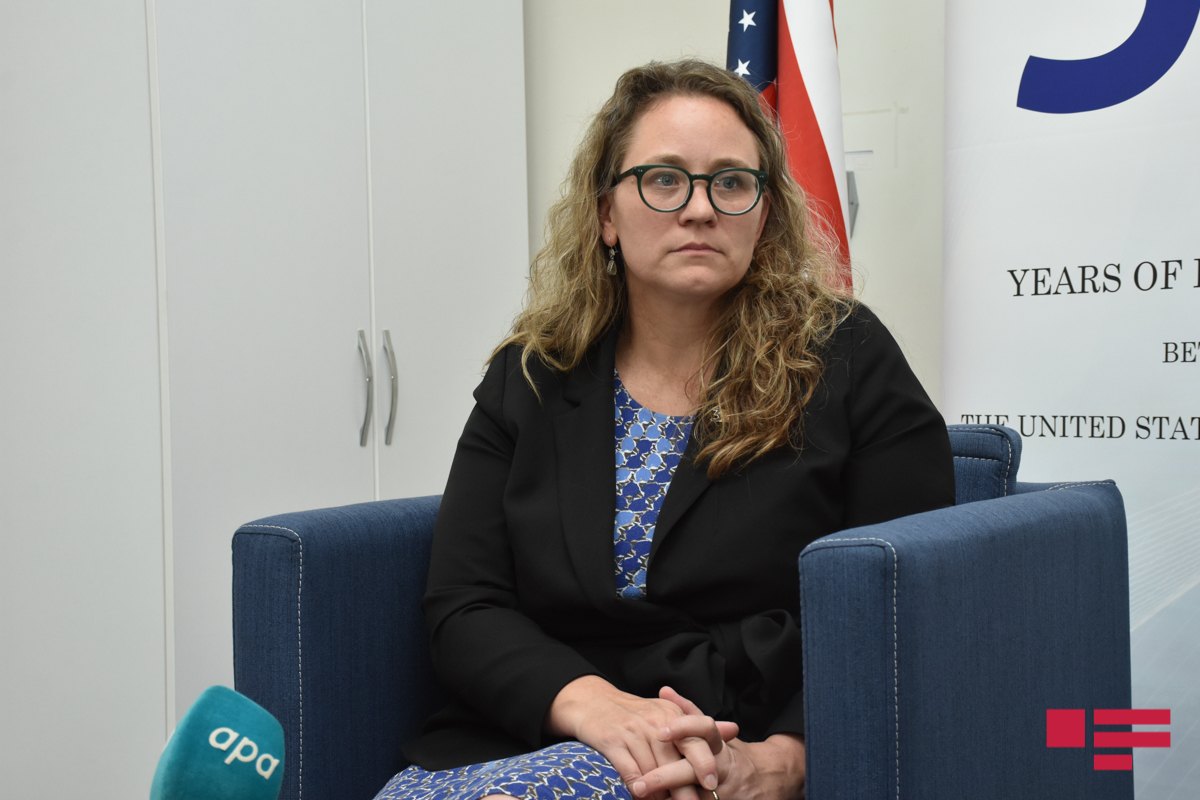
In terms of the United States, look, we remain steadfastly committed to Ukraine’s sovereignty and territorial integrity, we remain committed to helping the people of Ukraine to combat this unjust war, I think, you might have seen Secretary of State Blinken and Secretary of Defence Austin recently returned from Kyiv where together they demonstrated in a real way the United States stalwart commitment to Ukraine, to the Ukrainian government and to the people of Ukraine.
Ukrainians have defended their homeland and freedom with amazing courage, skill, and resilience. Though Russia’s vicious assault continues, the fact is Ukraine has not fallen. As President Putin said, he was so sure it would and instead, Ukraine won the battle for Kyiv and they will keep fighting for as long as it takes and the United States will be with Ukraine for as long as it takes.
– So far what we see is sanctions do not stop the Russian war in Ukraine. I want to ask about the effectiveness of sanctions…
– I think we all need to remain fully dedicated and united in terms of our support to Ukraine, to support the government of Ukraine, the people of Ukraine.
As you mentioned the sanctions, are the most comprehensive and coordinated sanctions that I think the world has ever seen. We have worked very hard to build it, to work with our colleagues, particularly, in the European Union but across the region in terms of implementing sanctions that will directly impact President Vladimir Putin, the Russian government, and will be them to stop this war.
But as you know, this is fundamental, this war stops when Vladimir Putin stops the aggression that he has undertaken against the Ukrainian people. I think we will continue to see more and more harsh sanctions that end exactly when it will stop this war. I think we will continue to see from the United States, but I hope, the entire region, including the entire world including Azerbaijan continues to support Ukraine in humanitarian, energy, and security areas and we just need to remain steadfastly united in what is a very difficult struggle.
Indeed, perhaps one of the things the Russians and President Vladimir Putin did not expect was that there was growing unity and solidarity among allies and partners in the face of this terrible occupation.
We really appreciate the work done by Azerbaijan, everything you do to support the people of Ukraine, and humanitarian aid.
– After this war, a new security environment is coming out, apparently. What will be the United States’ role in the region of Europe, in the particular post-Soviet region?
– I think with Russia’s invasion of Ukraine what the world will look like next year, or five years, ten years, we know it won’t look like what it looked like in January.
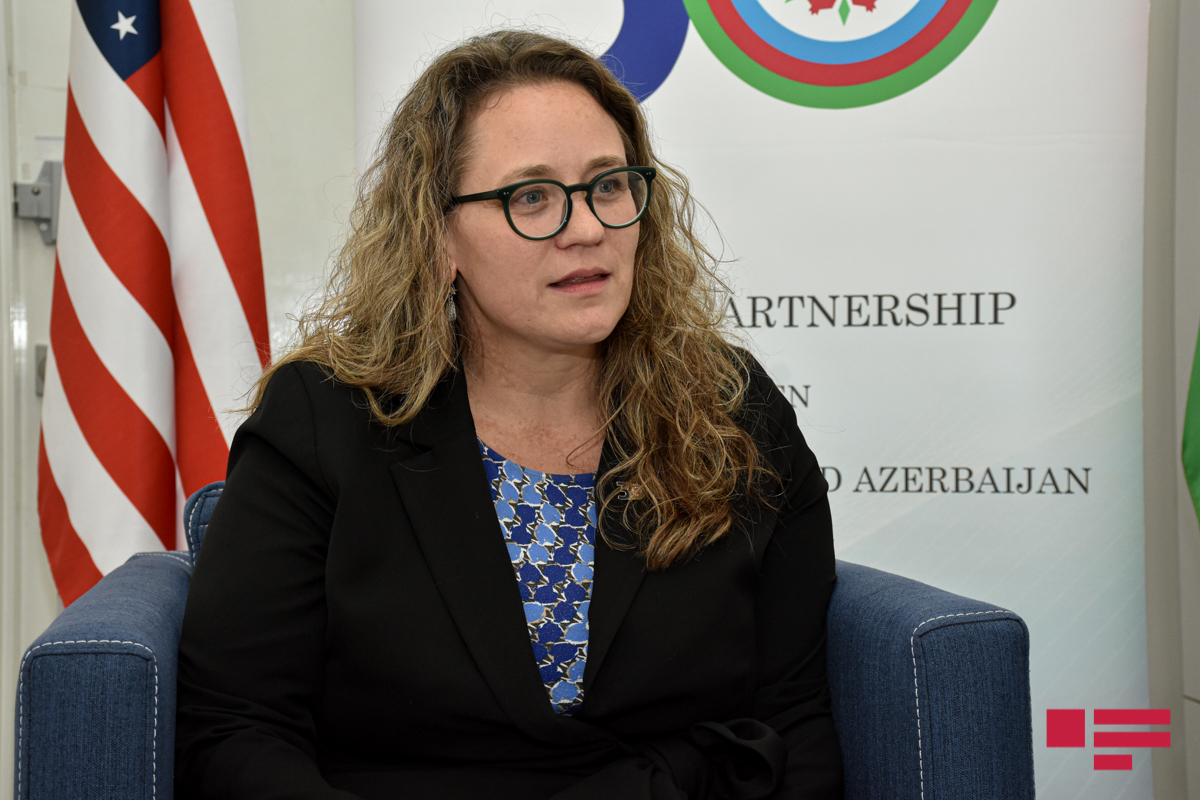
This question of the US in the region, in the security of the region, we remain absolutely and fully dedicated as a partner and as an ally when it comes to Transatlantic security.
One of the things we have seen is amazing unity within the NATO alliance and you do not have to go back too far to find some leaders talking about NATO being dead. I think we now have a very clear answer that the alliance is more important now than has ever been.
You asked about the question of the region of former Soviet space, I think that you have seen in the Caucasus region the increased engagement and increased focus by the United States to support peace, stability, economic development, sovereignty, and independence.
I mean as we look at thirty years of bilateral relations across the region, also thirty years of independence and I think President Biden has made this very clear on multiple occasions.
In the case of Ukraine, there are no decisions about Ukraine without Ukraine, no decisions about Europe with not Europe in the room and I think that applies to the entire region.
The countries of the former Soviet Union have made incredible strides in the last thirty years and our very important partners to the United States, we will continue to work together to support those development efforts and to support the independence of the region.
Photo by Ilkin Nabiyev © APA
—————————

Erika Olson is the Deputy Assistant Secretary of State overseeing policy for Southern Europe and the Caucasus. She previously served as Director for Regional Political Military Affairs in Europe guiding U.S. participation at NATO and the OSCE. From 2019-2021 she directed the Office of Northern Europe, the Baltics, and Arctic Security. While serving as Economic Counselor for the United States Mission in Turkey from 2016-2019, she won the Department’s Herbert Salzman Award for Excellence in International Economic Performance. Overseas she has also served as Political Counselor at the U.S. Embassy in Bratislava, Slovakia; Deputy Political Economic Counselor at the U.S. Embassy in Tbilisi, Georgia; Political Economic Counselor at the U.S. Embassy in Tashkent, Uzbekistan, and Consul and Economic Officer at the U.S. Embassy in Bishkek, Kyrgyz Republic. In Washington she was Senior Advisor and Acting Chief of Staff to Deputy Secretary of State for Management and Resources Heather Higginbottom and a Watch Officer/ Senior Watch Officer in the Secretary of State’s Operation Center. She entered the State Department as a Presidential Management Fellow in the Bureau of Economic and Business Affairs. Prior to joining the Foreign Service, Ms. Olson worked alongside Ambassador Robert Oakley at the National Defense University on conflict and resilience. She advised the Director General of the Foreign Commercial Service at the U.S. Department of Commerce, and worked for Microsoft and the Mitsui Corporation. Erika holds a M.A. in Foreign Affairs with a concentration in international economic policy from The George Washington University’s Elliott School of International Affairs and a B.A. with Honors in psychology and Japanese studies from Whitman College. She studied at Doshisha University in Kyoto, Japan. She speaks Turkish and Russian, and has studied Japanese, Georgian, and Slovak.
